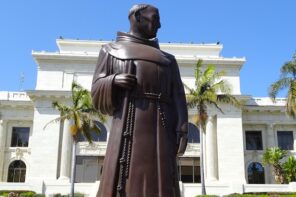Yesterday as millions across the United States celebrated Mother’s Day, we began to mourn the death of one of our mothers, Cuban-American ethicist Ada María Isasi-Díaz. Ada passed away at 1:40am after battling a very aggressive cancer. With her death comes a great loss, not only to academic scholars of religion, but also to the Roman Catholic Church, and perhaps most importantly, to the many individuals that she mentored throughout her career.
Ada is most recognized as being the mother of Mujerista theology. Her Christian ethics interwove theoretical analysis, autobiography, and ethnographic research. Long before the field of Religious Studies took its more recent ethnographic turn, Ada was interviewing grassroots Latinas and using their insights as the starting point of her ethical analysis. Her discussions of racial identity and hybridity are one of the first that highlight the presence of Afro-Hispanic culture and religion. Ada’s research on lo cotidiano argued for the epistemic value of everyday life within the study of religion.
Early in her career Ada was very involved in the Women’s Ordination movement. This activism clearly informed her work, as did the racism she experienced within the movement. Throughout her career she built bridges with her homeland, both teaching in Cuba and taking students from Drew University. At the time of her death she was working on a project on reconciliation. I find it fitting that a career that began with her first single authored volume entitled La Lucha (the struggle) ends with reflections on reconciliation.
With the current controversy over the Vatican’s assessment of the Leadership Conference of Women Religious and the pope’s recent visit to Cuba, the many issues that defined Ada’s career are as important now as they have ever been.
The first writing I read by or about a Latino/a in the field of religion was Ada’s “A Hispanic Garden in a Foreign Land.” This essay changed my life, for not only did I realize that there were Hispanics with Ph.D.s writing in the field of religion and theology, but also that they were writing about the Latino/a community. It is because of this essay that I went to graduate school, and had it not been assigned in my undergraduate Feminist Theology class at Georgetown University I might not be an academic today.
There are very few intellectuals that create “before and after” moments in our field. Ada María is one such a figure. Before her no one had written about Hispanic women’s spirituality. She opened up an entire field of study through her writings, lectures, courses, and relationships with students.
I never had the privilege of being Ada’s student, though she has been my mentor since I began my Master’s eighteen years ago. Ada reached out to me as a student when I was feeling very isolated as one of the few Latinas studying at Union Theological Seminary. Throughout my Ph.D. and the following years she has been a constant source of support and insight. Even when I was a Master’s student she would ask to read my work and offer thoughtful commentaries. I know I am not the only Latino/a that she has mentored in this manner.
Ten years ago, when I was a faculty member at Loyola Marymount University I invited Ada to speak to a group of faculty, staff, and students. The students were primarily Latino/as who had read her work through one of my courses. Before she began her presentation she asked me to introduce her to all of my students and went to personally shake their hands. They were overwhelmed that in a room full of faculty and University administration she had chosen to greet them.
This gesture embodies Ada as a person and as a scholar. She was never seduced by academic elitism, and the grassroots Latinas who are the center of her theology truly are her intellectual peers. She jokingly told my students that day that she found everyday people much more insightful than the dusty volumes of theological texts many of us read and write. This assertion is visible throughout Ada’s corpus and in her everyday actions, which, as she has taught us, are vital to the theological task.
The title of your last published volume proclaims, “La Lucha Continues.” The struggle will continue Ada. We are grateful and humbled by the doors you opened for so many of us through your passion, humility, love, and brilliance.




